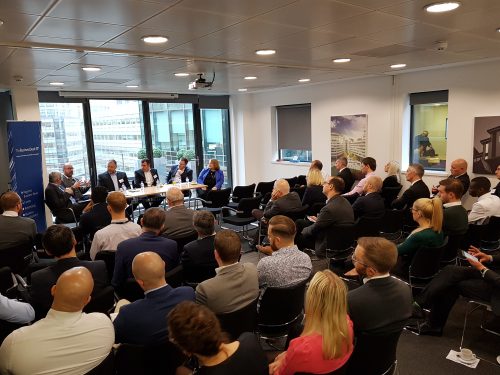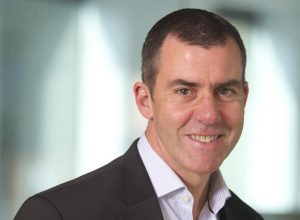Secrets of success: From funding to innovation

As part of our SME Week TheBusinessDesk.com held a panel discussion looking at the issues surrounding running and growing a business.
Yesterday we published the first article based on our discussion which focused on the issues connected to leadership and managing people.
The discussion was held at JMW’s offices in central Manchester and covered a wide range of topics from innovation to funding.
The week-long series has been sponsored by JMW along with ETC Tax and the Growth Company.
Our panellists at the event were:
- Gordon Kermode, who worked with Kellogg but now works with SMEs advising them on leadership, management and team building
- Steve Trainor, who has many years of experience leading businesses and most recently co-founded procurement firm Odesma
- Ged Rooney, director of construction firm Bardsley Construction
David Byrne, former PWC director, who is now chief financial officer with Converge Technology Specialists
- Joy Kingsley, senior partner at law firm JMW
Steve Trainor tackled the issue of funding.
He said: “From our point of view we started with a very clear view of where we wanted to get the business to.
“In the first four years we were talking about growing the business organically and getting it to the position where we wanted it to be.
“We knew when we started out we would need investment to grow, we thought about it at the beginning because accessing funds can take some time.

Steve Trainor
“We tried to be very clear about what we wanted to do and where we wanted to be at various points. That is something we bought with us out of corporate planning.”
David Byrne added: “If you know you are going to need investment for a business at some stage then you need to start preparing at least six months before.
“Otherwise you can become desperate and your choices and options and the cost of debt can become an issue.
“The second thing I would say is to keep the business plan up to date at least once or twice a year, so you have got something you can share with people.
“You need to be able to clearly sell your vision and plan to investors and a business plan is usually the best way to do that.”
Ged Rooney added: “We have a big issue with external funding because you are looking at £25m to £30m schemes.
“Once the contracts have been signed its fine, its just a case of getting that initial investment.
“External issues can spook the market and we can’t control that external funding. Because it is very much boom or bust we can’t always plan our work. We are in the hands of others.
“That’s our biggest issue. If people do get the jitters and decide to delay a scheme then the impact on our supply chain is enormous but you can’t force people to build stuff if they don’t want to.
“There is no shortage of opportunities so long as the funding is there but we have no influence over that.”
David Byrne tackled the subject of innovation.
He said: “Innovation comes in two levels. First of all, there is innovation in how you do things in your industry.
“You have to open to new ideas and you have to have a thirst for learning which means understanding how other people do things. That is the harder side of things.
“There is also innovation in terms of your processes and systems, that in many ways is the easier bit. Technology has made that much easier.
“Sometimes it can be painful to change but it can be easier from the conceptual point of view.”
Joy Kingsley said: “It is useful to have people who are entrepreneurial but there are different tasks to carry out in a business.
“You can’t just have a whole load of people being entrepreneurs while nobody is doing any work or managing the workload. Across the board you need to have your skills aligned.
“Questioning yourself is always a difficult thing to do, some lawyers have always known success, so they think they are good at everything.
“In general people find it difficult to look at themselves and ask why they are doing something in a particular way.
“The question I always ask myself is it good for JMW? Where people are finding managing difficult and are trying to please everyone in the business, they end up have endless conversations and the business doesn’t move forward.
“As long as you keep the business at the centre of your thinking then it becomes a bit simpler.”
Ged Rooney added: “You have to find the best answer for the business and that is inevitably going to upset someone.
“One of the issues with our industry is that you cannot force innovation because it comes with enormous risks. Innovation generally comes with massive risks, that can be very costly, especially in a younger business.
“What you have to find is the consensus of opinion that is best for the common good, if you start taking individual gain as the driver for your business it is not going to end well.
“People are there to make the right decisions, that is what they are supposed to do.”
Steve Trainor said: “The emphasis in our business is twofold. To grow the business and to deliver great service. Our business feels naturally entrepreneurial, but you still have to be really hard on yourself.
“I always ask myself am I helping whenever we are having a debate.”

Gordon Kermode
Gordon Kermode said: “Great talent always has a choice, people’s level of expectation in the workplace is much higher.
“The world of work is going to change over the next ten years. We will be paying people much more for more around outcomes rather than for how long they sit behind their desks.
“If you are clear about what outcomes you are looking for then how somebody choses to do their job becomes irrelevant.”
David Byrne said: “In the tech sphere there is a challenge around recruitment, there is a huge demand talent.
“Younger team members have a very different ideas what they want out of the workplace.”

Joy Kingsley
Joy Kingsley added: “Recruitment is a challenge. The whole millennial thing is an interesting area.
“Communication is now more important than ever, you need to tell people why you are doing things in a certain way.
“Communication has to be ingrained in the business and that means it has to be ingrained in the most senior people in the business.
“Not everyone can be involved in the decision making process but it is still important to keep everyone informed.
“There is always going to be change and the key is how you adapt to what the market wants.”



 David Byrne, former PWC director, who is now chief financial officer with Converge Technology Specialists
David Byrne, former PWC director, who is now chief financial officer with Converge Technology Specialists






